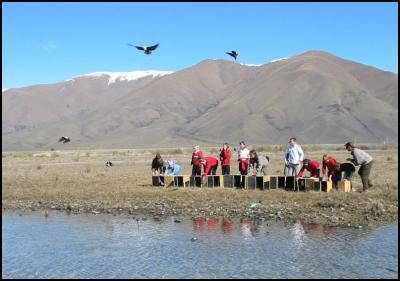Endangered kakï (black stilts) released at Öhau
Endangered kakï (black stilts) released at the Öhau
River delta
People’s chances of spotting a rare kakï (black stilt) increased today with the release of 39 young kakï at the Öhau River delta, just south of Twizel. The young birds were raised in captivity by the Department of Conservation’s Twizel Area Office as part of the Kakï Recovery Programme.

“This is the first time we’ve released so many kakï in such a popular area,” said Dave Murray, Programme Manager for the Kakï Recovery Programme. “It’s quite likely anglers and four-wheel drivers will encounter them, either around the delta or up the Tekapo, Pukaki or Öhau rivers.”
Mr Murray said that the released birds are not yet old enough to breed so the presence of people is unlikely to pose a threat. However he recommended that recreationalists take extreme care during spring and summer, when other river birds are incubating eggs and raising chicks.
“The main threat to the released kakï will be introduced predators like feral cats and ferrets,” said Mr Murray. “Eggs and chicks are particularly vulnerable but even adult kakï can be killed. Predation was probably the main cause of kakï decline originally.”
Despite this, Mr Murray says he is optimistic about the young kakï’s chances of survival. “Our past releases of 9-month old kakï have proved successful so we’re reasonably confident that this group will follow the trend. Being spring, the weather conditions are quite favourable and food supplies are plentiful which should ease the transition. We also give them supplementary food during the first few weeks.”
Over recent years, DOC’s Twizel Area Office have raised large numbers of young kakï for release into the wild. The aim is to boost the number of kakï in the wild and in particular, to increase the number of breeding pairs.
At the time of
European settlement, kakï were common in many of New
Zealand’s rivers and wetlands, but they are now essentially
restricted to the Mackenzie Basin. While conservation
efforts have succeeded in averting extinction and boosting
numbers, kakï remain one of the world’s most endangered
birds.


 PSA: PPPs Pose Risks To New Zealand Workers
PSA: PPPs Pose Risks To New Zealand Workers Office of the Privacy Commissioner: New Research Shows Business Leaders Fear Being On The Hook For Others’ Privacy Breaches
Office of the Privacy Commissioner: New Research Shows Business Leaders Fear Being On The Hook For Others’ Privacy Breaches E Tū: E Tū Members Send Open Letter To James Grenon And NZME Board
E Tū: E Tū Members Send Open Letter To James Grenon And NZME Board Commerce Commission: Commission Calls For Comments On Copper Access Deregulation
Commerce Commission: Commission Calls For Comments On Copper Access Deregulation New Zealand Association of Scientists: NZAS Supports Saving Biotechnology Capacity In Callaghan; Asks What Now For Applied Technology Group
New Zealand Association of Scientists: NZAS Supports Saving Biotechnology Capacity In Callaghan; Asks What Now For Applied Technology Group Stats NZ: Business Employment Data - December 2024 Quarter
Stats NZ: Business Employment Data - December 2024 Quarter



